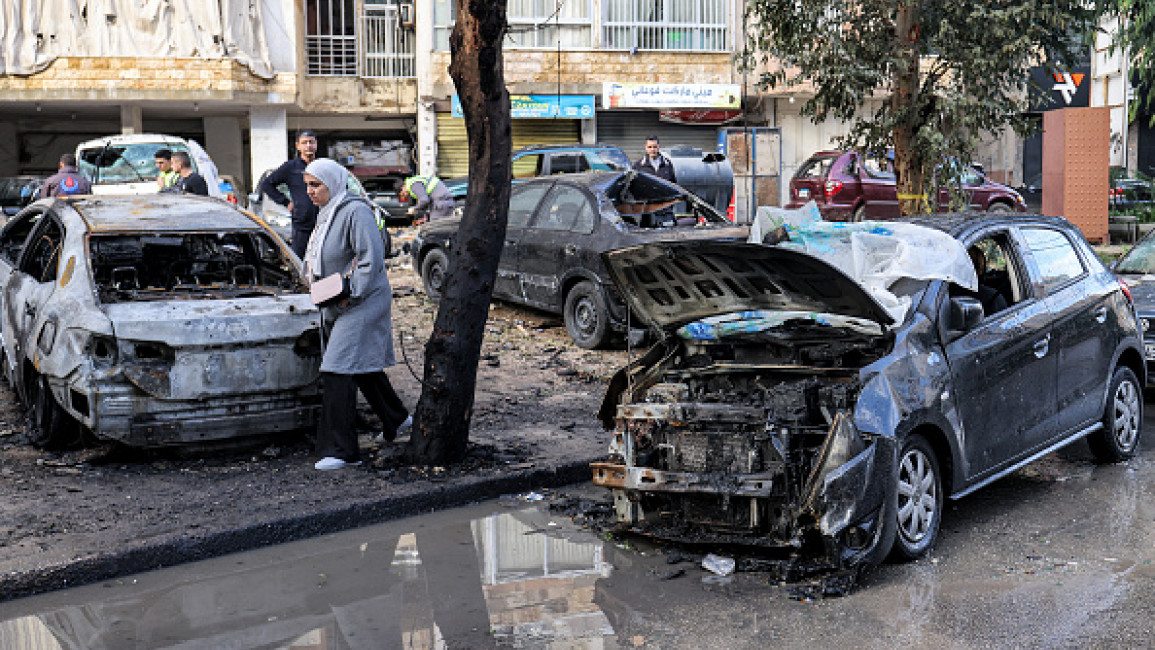Lebanese prepare for worst after Israel's Saleh al-Arouri assassination
Lebanese woke up to the reality of the first Israeli attack on Beirut since the 2006 war, following the assassination of Hamas deputy leader Saleh al-Arouri in Dahiyeh on Tuesday night.
An Israeli drone strike hit a Hamas office in Al-Mousharrafieh neighborhood of Dahiyeh, where a meeting was reportedly taking place between Palestinian factions, killing seven men and injuring 11 others.
The 'thunder-like' strike was heard across the city while footage shared by local media showed a floor of the building hollowed out, the street strewn with debris with a car ablaze nearby which was reportedly hit by a second strike.
While the attack marked the first time that the capital had been struck since the 2006 July war, which saw swathes of Dahiyeh decimated by Israeli air strikes and 1,200 Lebanese killed in 34 days, this time it did not dent daily life for those in the city.
Engineer Jad Chehemi, a resident of Salim Salam, a few kilometres from the explosion site, told The New Arab that shops were open, cars were on the road, and men on the streets, with business-as-usual ruling the day.
"I think Beirut is numb but deeply worried," he said over the phone. "But in my neighbourhood and also in eastern parts of the city, I have seen shops and cafes open, and it is very very normal."
There was one conspicuous absence, however, which was that no demonstrations, street protests, tire burning, or roadblocks erupted following the attack on Lebanese soil.
The city, which is home to around two million people, is famous for its civil disorder and years of anti-government protests when life ground to a halt during the October 2019 revolution.
But the silence which took over in the hours following the assassination on Tuesday night indicated a quiet worry for what might come next for the country which has historically been dragged into neighbouring conflicts.
Many fear that the attack might incite Hassan Nasrallah, the powerful Shia cleric and leader of political group and Hamas ally Hezbollah, to give the green light to an escalation in fighting.
For weeks there has been speculation of heavier retaliation from Hezbollah.
Border clashes have intensified, casualties among Hezbollah fighters and civilians have hit over 150, and thousands remain displaced from southern villages.
The New Arab’s correspondent in Beirut, William Christou, reported that "palpable anger" could be felt in the city following the strike.
"The idea that a foreign state could conduct a targeted assassination with impunity in the heart of Lebanon’s capital is seen as a violation of the country’s sovereignty – even among those not supportive of Hezbollah," he said.
There are also fears that al-Arouri's assassination will lead to an expansion of the fighting between Hezbollah and Israel, which has so far been confined to Lebanon’s southern frontier, he said.
Following Tuesday night's attack, Hezbollah said in a statement that "its fighters’ fingers are on the trigger" and that "repercussions of the attack will be witnessed in the upcoming days".
Nasrallah is due to speak in a national address on television on Wednesday to mark the four years since the killing of senior Iranian general Qassem Soleimani who was killed in a US-ordered air strike in Baghdad.
But with the surprise Israeli attack on Lebanon's Hamas faction, Lebanese are holding their breath for any inkling of a war declaration among the Shia cleric's typically ambiguous rhetoric.
Beirut’s southern suburbs of Dahiyeh are mainly home to Shia and Sunni Muslim families, many of who originate from villages in the south of the country and recognise the shadow of war with Israel all too well.
While it is apparent that Tuesday night’s drone attack targeted Hamas officials, it nonetheless would have been felt by the thousands of families who live in the densely-populated neighbourhood, some of whom would have fled since the start of fighting between Israel and Lebanon in October.

![Trump's warm greeting to Netanyahu contrasted with Kamala Harris's critical reception [Getty]](/sites/default/files/styles/image_212x120/public/2024-07/GettyImages-2162908988.jpg?h=69f2b9d0&itok=uRh_9WXh)
![The brutal assault on Khan Younis has killed dozens and displaced thousands more [Getty]](/sites/default/files/styles/image_212x120/public/2024-07/GettyImages-2162526709.jpg?h=d3eda8cf&itok=HCP84AvQ)
![Members of the Algerian delegation threw roses into the Seine [Getty]](/sites/default/files/styles/image_212x120/public/2024-07/GettyImages-2162980872.jpg?h=199d8c1f&itok=PDhNyMBE)